
From his book, "Black Hills Ballads"
Robert V. Carr (aka Bob Carr) was the official poet of Seth Bullock’s Cowboy Brigade. I got an email from Carl Steiger the other day, which prompted me to see what all I could find on Mr. Carr. Based on census records, as well as a mention by Cabot Yerxa in one of his articles, Robert Carr appears to have been born in Illinois, and not South Dakota, as mentioned in some sources.
STORIES PICKED UP.
Th’ trees are whisperin’ a tale,
Of shade an’ lazy dreams;
Of loiterin’ and lingerin’,
Beside th’ singin’ streams —
‘Tis loafin’ time.
Th’ woods are makin’ love to you,
They’re callin’ you to jest
Come out from work an’ idle there,
Upon th’ lap of rest —
‘Tis loafin’ time.
— Robert V. Carr.
Des Moines Daily Leader (Des Moines, Iowa) May 17, 1902

SIMPLY TO LIVE.
(By Robert V. Carr in The Jaw Bone.)
To simply live, and drink of Sorrow’s cup
To know of Happiness, the blessings of Content;
To love, to hate, to rest, to strive and toil,
And know that all is for a purpose sent.
To simply live and gather by the way
Impressions which e’er mould and make the character of man.
Tri-City Star (Davenport, Iowa) Oct 18, 1904

Cowboy Lyrics.
“Cowboy Lyrics,” by Robert V. Carr, is a neat little volume of poems published by the W.B. Conkey company, Chicago.
If one is surfeited with the conventionalities of city and society, if one would have the open and unbroken prairie, if one would see the “bronco buster” in real leather breeches, if one would know the appetite before the call for dinner of the cow puncher, if one would see the roundup as it really is, he should get these “Cowboy Lyrics.” There are human tastes and human passions in the book, and they are related with much warmth and expression by the uncultured poet of the “Old Pactola Trail.” The spirit of the author is in “The Old Cowman.”
I’m not so young as I uster be,
I’m somewhat gray and wrinkley,
An’ I wear my hat — my old white hat —
On the back o’ my neck on a roll o’ fat
An’ I don’t ride much like I uster, tho’,
I’m not so dog-goned gumbo slow
When it comes to bronks, but yet I’ll say,
A buggy fer mine ‘most any day.
But my heart is young, oh, my heart is young,
An’ she sings the songs like she allers sung;
Dealin’ fair and dealin’ square,
An’ findin’ friendship everywhere;
An’ never a fear does she let slide,
Fer the day when I cross the Great Divide.
Old pards are gone — no use to care,
They’ve rode the trail to Overthere;
But I’ll see ’em again, I should shout!
To jes’ shake hands fer all get out!
I’ve no regrets an’ that’s no lie,
A white man’s never afeer’d to die;
Old age an’ death has got to be,
An’ by the bods, they don’t scare me!
Milford Mail (Milford, Iowa) Jun 25, 1908

ROBERT CARR, COWBOY POET, PAYS A VISIT TO BUTTE
Robert V. Carr of South Dakota has been visiting in Butte the past few days. Mr. Carr has gained fame as the author of a little volume of verse styled “Cowboy Lyrics.” The volume is in four divisions, “Ranch and Range,” “On the Trail of Love,” “Where the Chinook Blows” and “The Road to Yesterday.” In the verses are found faithful pictures of cowboy life, as it is, life on the range and through the great West. Mr. Carr is possessed of a genial humor, a practical philosophy and kindliness of heart which find voice in these poems and are bound to make them most popular.
The Anaconda Standard ( Anaconda, Montana) Oct 25, 1909

“How.”
I’d like to meet you anywhere,
Along the sunset trail
An’ roll with you a cigarette,
An hear a range-land tale.
I’d like to hear you drawlin’ speak
That word that rhymes with cow,
An’ tastes o’ sage an’ alkall —
That little old word “How.”
I’d like to sight you from a raise
Upon the Big Divide
I bet I’d know you from the way —
The reckless way you ride.
I bet I’d yell — Aw, blame the luck!
I’d give the world jes now,
To hear the pound o’ hoofbeats an’
that little old word “How.”
Fer charmed, I’m sure, an soft handshake
Of high society,
Somehow, don’t never git its rope
Upon the heart o’ me.
I want to beat you on the bark,
In joyous, friendly row,
An’ call you names — I want to hear
Taht little old word “How.”
— Robert V. Carr in the Popular Magazine.
Syracuse Herald (Syracuse, New York) Feb 25, 1911
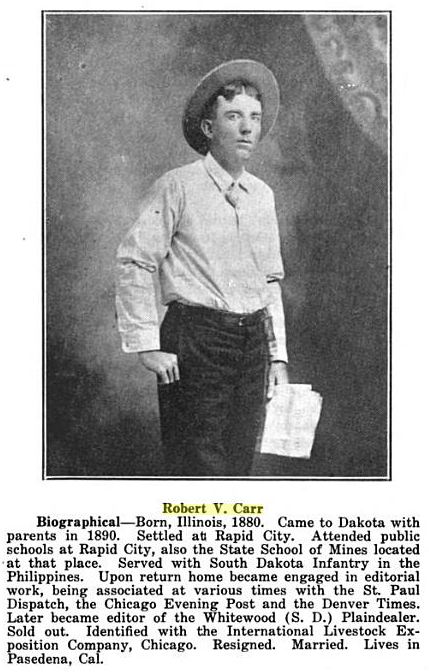
From Literature of South Dakota - by Oscar William Coursey
NEW BOOKS
Robert V. Carr, the author of “Cowboy Lyrics,” of which a complete and revised edition will be issued by Small, Maynard & Co., of Boston, in October, did not write his lyrics of the western cattle range from the window of a Pullman, or in ease and comfort.
Mr. Carr, in a recent interview, tells of his first attempts to lariat the wild and untamed muse.
Said he, “You must not think that the way of the writer of western verse is strewn with posies. I believe I was about 14 years old when, in addition to an overpowering ambition to be a cowboy, I began to cherish fond hopes of becoming a writer. Possessing a couple of Indian ponies, I drifted from ranch to ranch, from cow outfit to cow outfit, and when I was not annoying the cooks, I was scribbling poetry. Some of those verses I sent to a country editor. He returned them with a note to the effect that they were not worth space. Years later that editor transgressed the law and was sent to jail. That served as an awful warning to me, and later, when I became a country newspaper editor, I always published the poetry sent in.
“Still, in the camp and on the trail in that trampled country north of the Black Hills of South Dakota. I wrote of the things I saw. Sometimes they were printed, but more frequently rejected.
“I left the western country for a bitter experience in teh army in the Philippines and returned to the Black Hills a physical wreck, but still writing. I then sought the cities, but managing editors had little space for western poetry and I drifted on. In that time I came in contact with the down-and-outs, the hungry men, the broken men. I need no books to tell me of despair. In many a dark hole in the city I longed for the clean prairies and a sniff of sage. But still I scribbled. And in time I returned west.
“Years later, when my old cowboy friends had coiled their ropes forever, a magazine editor wrote me, asking for some cowboy lyrics. I was the most surprised mortal in the United States. The editor got his lyrics and I received a check. I hated to cash that check. Naturally, one does not desire to part with something that has cost him 15 years of fighting.
“Yes, the way of the poet, like that of the transgressor, is hard; but yet, when I get a friendly letter from one of the boys in the west, or some chap whose authorship is confined to chalkmarks on water tanks, I do not regret the efforts. I am thankful that I was made to suffer, for it is only by suffering that we learn anything worth while.”
The Deseret News (Salt Lake City, Utah) Jan 4, 1913

TONOPAH.
Robert V. Carr, in The Popular
Slung his money like he knowed
He had staked the mother lode
Wine and song and all the rest —
Everything the very best
Said he wanted to get rid
Of his excess dust — he did!
Wildest splendor ever saw
Struck it rich, had Tonopah
Friend had he — fair-weather kind,
But he did not seem to mind
Said that he proposed to live
While he had a chance, and give
Every kind of sin a test,
So he’d know which was the best
Swiftest sport I ever saw,
That prospector, Tonopah
Throwed his coin across the bars,
Smoked them dollar-each cigars,
Buys of diamonds ’bout a peck,
This and that girl to bedeck
“Sparkler for a smile,” says he,
“Nothin’ cheap now goes with me.”
And the beat I never saw
Of that there young Tonopah
Then one day the cuss went broke,
Put his watch and chain in soak,
Friends began to drift away
And to dodge the sad-faced jay
See that poor bum over there
Beggin’ for two bits? I swear!
That’s the young sport I once saw
Down and out — old Tonopah!
The Washington Post (Washington, D.C.) Jan 26, 1913
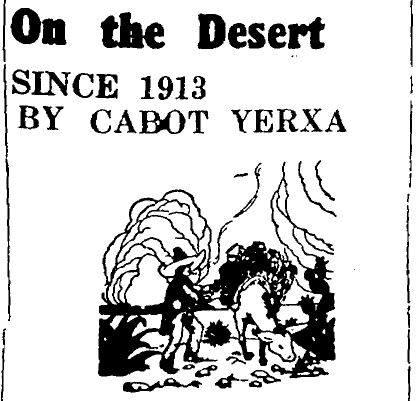
Both Cabot Yerxa and Bob Carr homesteaded here in 1913. Five months of each year was spent in other localities, in pursuit of dollars to keep them going through the seven months they spent on their homesteads. Bob Carr finds a position as writer for Keystone Comedies under Mack Sennett, but is told most writers only last a week. All writers are in one large room and from their various yarns Sennett selects what he considers the best to make a picture. Mr. Yerxa continues:
Shortly after Bob Carr was installed, Mac Sennett came into the room, instructing the writers they must use what was on hand in the Studio to form their stories.
There are now on the pay roll one cross-eyed man, a jig dancer, one fat woman, an Irish comedian, one small elephant, two negroes, and six bathing beauty girls. Their bathing suits are all new and we don’t want them to get wet.
Now you fellows go home and come back here in the morning, each with his own story. You must use these characters, they are all paid for by the month. We can not afford to hire extra actors, just for one picture. Go out on the lot and look over the sets available for backgrounds here in the studio. Search in the costume room, we have comedy police uniforms and other things of use perhaps. You picture story can take people to the beaches and places near Hollywood. But no long trips or over night stops, they cost too much. Income is not all we wish it was, because the public seems hard to pull away from old fashioned theatres.”
Bob stayed up nearly all night working on his story construction. The waste basket was full of discarded copy, but he felt satisfied with his plot and action, as he entered the conference room next morning.
Mac Sennett walked in early and ceremoniously laid down some typed pages and announced that he, himself, had written a story and proceeded to read it forthwith. Then he asked each man in turn what he thought of it. The assembled men, all complimented the story very highly, because they hoped to stay on the payroll over Saturday night. Sennett was not above praise and he beamed under the barage of honeed words. Turning to Bob, the last man, he questioned, “And you, Carr, what do you think of my story?” Bob needed to be on the payroll very badly, but shrewdly felt that just to echo praise would get him nowhere.
He decided to be honest and replies quietly, “I think the story is rotton poor, and not worth building onto.” There was a hushed silence in the room!
(Continued next week)
Desert Hot Springs Sentinel (Desert Hot Springs, California) Oct 18, 1951

Mr. Yerxa continues:
The other writers knew that Bob was a goner Saturday night, unless Sennett fired him on the spot. They waited.
But Mac Sennett was no rich man’s son sitting in the easy chair of authority, prepared for him by some doting father. He had come up the long hard road, lifted by his own bootstraps. Not too long ago he had been carrying a spear in a crowd of extras hired for the night on a New York stage. His present position of success and rising prominence in a new industry had been won by showing foresight, originality, and much determination. Many things far more complicated than a story lay on his desk for solution. Therefore the writing of a script was not too important. Although take aback by the blunt criticism, he was inwardly pleased by the new man’s courage of conviction. So in an even voice, he asked Bob what was wrong with it, and Bob picked the story apart. Then Sennett questioned, “All right, Carr, now read your own story.” Bob did.
Sennett approved, and ordered it to be used for the first draft of the new senario.
Bob stayed on the payroll over the first Saturday night, and indeed was kept on the story writing staff until the time came for him to return to the desert….
Desert Hot Springs Sentinel (Desert Hot Springs, California) Oct 25, 1951

The most picturesque and attract[ive] cabin on the desert in homesteading days was that of Bob Carr. This was “B.A.”, before autos. There is something sacreligious about riding over the desert or up to a cabin in an automobile. The Desert is so quiet and clean, and wild life so retiring amidst the scant vegetation, that a mere man made machine roaring about is sadly out of place.
The Carr cabin was on a sandy shelf thirty feet above the desert floor, with a clear view to the south and of San Jacinto Mountain. On the west was a thick high bunch of mesquite which gave ample shade and furnished complete protection from the west wind.
It was built of up and down boards with cracks covered by batt strips. All knot holes covered carefully with tin can covers. The one living room was 10 x 14 feet. Cast iron stove at the east end and small sleeping porch at the west end. The only furniture was a plain pine unpainted table, with Bob’s typewriter, the only dictionary in the desert, and a few books of synonims. Three plain wooden chairs and a couple of boxes for extra seats and a pile of mesquite wood for fuel completed the cabin requirements.
Yet with this meager array, his quiet wife, Stella, was able by her ingenuity and feminine view point to make the cabin extrememly attractive. Little plants in dishes and cans, home made curtains at the windows, spotless dishes, magazine pictures, picked with care, fused with Congress. He made pinned here and there, and curtains and stiched covering shelves made the room very cheerful.
(Continued next week)
Desert Hot Springs Sentinel (Desert Hot Springs, California) Nov 1, 1951
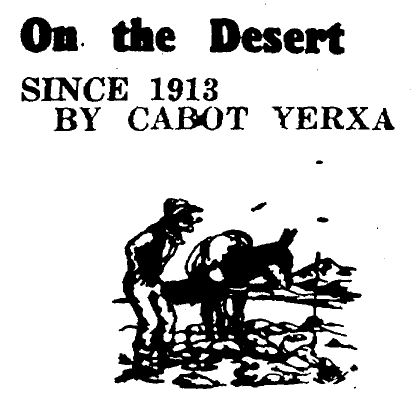
Mr. Yerxa continues:
Stella was a very excellent cook and made wonderful bread. Whenever Bob was out at night she always had a lighted lamp set right against the window glass, and we could see this for many miles, as we trudged cabinward from the railroad post office through desert sand in darkness. Stella Carr was a cheerful companion to Bob and pioneered all through the homesteading days, and at his death, took up her home in Sierra Madre, California, where she now lives.
On that pine table, Bob wrote many a magazine story, novelette, and western poetry, which has amused and interested thousands of people all over the United States. He had a flare for using characters in western settings and stories to make readers laugh. Others were war stories from his experiences in the Spanish American war, or straight western style, cowboys, miner, and Indians.
Bob Carr was a delightful personality and a great comrade. We had wonderful days on the desert together. Just we two walking about, examining all the new things of the desert about us, and enjoying endless conversations, about philosophy, religion, history, poetry, books, Indians, explorers, and the strange complication that civilization has brought into human life. And always with us was that intelligent burro “Merry Xmas.”
Desert Hot Springs Sentinel (Desert Hot Springs, California) Nov 8, 1951

Bob Carr always viewed any situation from the dramatic angle because he was a born story teller. One day after the wood boxes were heaped high, and all the water pails full to the top in both cabins, he and I got to discussing what two men could do with their bare hands if lost in the desert without food or equipment. Or two Indians running away from marauding tribes. So we approached the problem this way. We hunted round for clay, carried some to Two Bunch water hole, formed a shallow wide dish, and hastily burned it. Although badly cracked it served our purpose to bring more clay to our pottery work spot.
We had used matches to start our fire as twirling a stick to get a flame we considered unnecessary time loss.
Having now abundant clay and water, we fashioned a crude olla to hold a gallon of water, and a rather deep dish with thick walls to cook with. Also we formed two small bowls to eat out of, and made two clumsy spoons. We placed these articles to dry slowly, and later in the day fired them in hot ashes. They held water. With carefully selected stones of the proper size we set out on the prowl for food. We succeeded in obtaining three small birds, and after a time one small cotton tail rabbit fell to our barage of stones. We could not in fairness use a knife, so we used sharp pointed sticks to aide in skinning and cleaning our game.
After searching we found a rock with an edge sharp enough to sever the heads and feet, and to cut up the birds and rabbit into small pieces. We filled the deep dish with water, threw in the pieces of meat and started them to cook over a fire. Some mesquite beans were gathered, cut up and added to the stew. Several sage leaves were added to give flavor. After considerable time the food was ready and served in the individual bowls and we had our clay spoons to use. Thus refreshed, we gathered branches, and palm leaves to build an Indian style “wick-i-up” and were well launched in the business of house-keeping.
Desert Hot Springs Sentinel (Desert Hot Springs, California) Mar 6, 1952

Cabot Yerxa
The Cabot Yerxa image can be found on Find-A-Grave, (LINK) along with a biographical sketch, posted by Jane Pojawa.
Cabot Yerxa, homesteading here in 1913…. Mr Yerxa continues:…
Bob Carr and his wife homesteaded on land joining mine in 1913. They kept a dozen chickens, which were well locked up at night. But at one period a chicken was missing every few days during daylight hours. Large animal tracks were noted, a few feathers scattered about and some drops of blood in the sand. That was all.
Bob cleaned his rifle and kept it near the door. On one bright sunny morning, he and I were sitting in the shade of his cabin speculating as to whether it was a coyote or linx responsible for missing chickens. Just then we heard a chicken squawk near the edge of mesquite brush, and looked in time to see a big spotted linx retreating with a full grown chicken in its mouth. Bob grabbed the rifle and we took up the trail. In a few moments we saw the linx with its prey and it saw us too. Whereupon the linx promptly dropped the chicken and advanced slowly towards us, menacingly. Stopping now and then with teeth bared and snarling, its glinting eyes steadily in our direction. We three were very close together now, and just for an instant the linx crouched low and steadied itself for a spring upon us. But Bob was cool and had been holding a line on the animal with his rifle. His shot went true to the mark and the linx never completed the spring, but fell within a half dozen feet of us, screeching and clawing the small brush and sand. Had we been unarmed we would have been in for a very serious encounter, indeed. Such a large animal could kill a man, or at least make extremely serious injuries.
(Continued next week)
Desert Hot Springs Sentinel (Desert Hot Springs, California) Mar 19, 1953

Cabot Yerxa continues his report of animals and men of the desert back in the early teens of our century….
The Bob Carr single pine board cabin, with a one slope roof, was on a sandy shelf above the flat desert and half hidden in thick undergrowth of mesquite and grease wood. Bob and I, had cleared several pockets out of the sandy depression amid the sand hills near his cabin. These pockets were circular open spaces in which a camp fire was safe and out of any adverse wind condition which might be affecting the open desert.
To these secluded spots we often went for talks and long discussions of outside news which had trickled in to us by mail. Sometimes to wonder at the way nature had provided plants, birds and animals, and other desert things with qualities which made their survival possible in such a land as this. For variation we talked about books, famous people, historical events, and pages out of history which have changed the course of the world. Sometimes Bob would recount again parts of his past life which had been very eventful and on some days we went over the trials and experiences which had befallen me, which were many and varied. Anyway, we spent very interesting hours crouched by small campfires buried out in the desert without benefit of radio or television which people find so necessary today. We did not even have a newspaper. There we were, just two men by a fire, in the middle of many thousand acres of land, with no roads, and no strangers prowling about. After I found the black burro called “Merry Xmas,” it would follow us and lay down by the fire, and I am not at all sure that “Merry Xmas” didn’t understand much that was said. Because its intelligence was so much greater than any ordinary burro.
(Continued next week)
Desert Hot Springs Sentinel (Desert Hot Springs, California) Mar 26, 1953
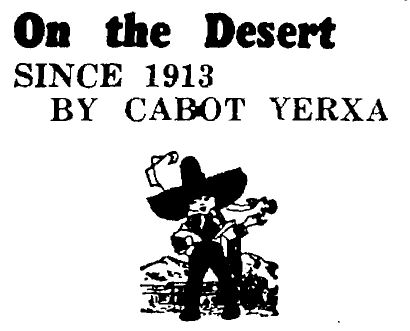
Bob Carr and Cabot Yerxa, both writers, enjoyed each other’s company and the desert before it became inhabited. Mr. Yerxa continues.
In a large mesquite tree of venerable age lived a family of seven great spotted white owls …standing fully twenty inches high and the wing spread of these beautiful birds of the night was astonishing. During the darkened hours they would often fly slowly, and close overhead with a ghostly swish of wings.
Sometimes they would come quietly to rest on a convenient limb and call a very mournful “Who, who.” This was all very eerie in these primitive surroundings.
To our campfire hideouts Bob and I took the occasional city visitors who chanced to come to see the desert and us. We would start out at night, in the dark from Carr’s cabin, walking single file, with the city man in line. We walked in circles, and loops, thru thick brush, sometimes on hands and knees under low lying mesquite branches. Then over sand hills, through rocky washes, and patches of cactus, until the weary visitor was nearly exhausted and at last drop into one of our secluded camp spots. Here a small fire was built and stories told of wild cats, mountain lions, linx, rattlesnakes, etc. The visitor thot he was miles away from the Carr cabin, and with the background of night and location of the camp fire spot all the stories seemed very real. But in fact we were never more than a quarter mile from the cabin. Often coyotes would yap, desert rats scampered about in the brush and sometimes the firelight glinted back from animal eyes peering out at us from the darkness. So therefore, when the large white owls sailed overhead slowly with a very audible swish of wings, and called “Who, who” in the blackness of the night, — all visitors were ready to return to the cheerful lamp lighted cabin. We walked them the same long way on the return journey, up hill and down and round about, so they never suspected that it was all a game which Bob and I enjoyed very much. The stories these men told in Hollywood about visits to Carr’s desert cabin were very amusing.
Balzac, the French novelist, often wrote a whole book just to set forth the character of one person, so Bob and I got the idea of writing very short character sketches for newspaper readers. Bob wrote most of these, but I helped along. They were published in Los Angeles papers, one every day.
(Continued next week)
Desert Hot Springs Sentinel (Desert Hot Springs, California) Apr 2, 1953

Bob Carr and Cabot Yerxa worked and played together on the primitive desert years ago. Mr. Yerxa continues:
Bob Carr had been a cowboy, miner, newspaper reporter, soldier, and columnist. He was the pioneer type man, but primarily he was a writer. We had plans all made to start a desert magazine here in this location when he passed away in Sierra Madre, California. It was too much of a problem for me to undertake alone, therefore the project never got underway. But Randal Henderson started the “Desert Magazine” so the field is now well covered.
Bob and I each wrote about one hundred of these characters cameos:…
Desert Hot Springs Sentinel (Desert Hot Springs, California) Apr 9, 1953

Here are some examples of the character cameos mentioned by Cabot Yerxa which also ran in the Atlanta Constitution, the Anaconda Standard and the Indianapolis Star (Above heading and cropped cameos are from the Indianapolis Star) :

*****

*****

*****

*****

Cabot Yerxa builds a house back of Miracle Hill in 1925. He tells of animals interested in his progress….
Into the new ranch house went not only my own small buildings, but the Bob Carr cabin from its place in the mesquite hills, which I purchased and took down board by board and hauled home….
Desert Hot Springs Sentinel (Desert Hot Springs, California) Apr 1, 1954

Cabot continues his description of the house he built back of Miracle Hill, recently the home of General Alexander and 27 Wolf Hounds. A fire destroyed the house and the General moved into a tin store house in back which was destroyed a few weeks ago.
Desert Hot Springs Sentinel (Desert Hot Springs, California) Apr 8, 1954
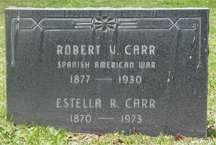
Carr gravestone also posted on Find-A-Grave (LINK) by Jane Pojawa.
NOTE: Notice the gravestone has Mr. Carr’s death as being in 1930, but the obituaries are from 1931.
ROBERT W. [V.] CARR, COWBOY POET DIES SUNDAY
Sierra Madre, Calif., Jan. 12 — Robert V. Carr, 43, known as “the cowboy poet of the Black Hills” died here yesterday. He had been living in the desert near Palm Springs while in search of health.
Carr for many years was a writer for the Whitewood, S.D. Plain Dealer, where he first began to celebrate the bad lands of that state in poetry. He later worked on newspapers in Chicago, Denver, Spokane and Seattle and edited a livestock journal at Sioux City, Ia. He came here in 1912.
Edwardsville Intelligencer (Edwardsville, Illinois) Jan 12, 1931

WESTERN AUTHOR CALLED BY DEATH
SIERRA MADRE, Jan. 13. — Death closed a life of adventure late Friday night when Robert Carr, 52, well known Sierra Madre author, died at his Canyon Park home following an extended illness. Carr, who lived in Deadwood, S.D., during pioneer days and edited a weekly paper there, came to Southern California 12 years ago. His adventurous life furnished material for his short stories which have appeared in many magazines. He as a veteran of the Spanish-American war. He is survived by his widow.
Arcadia Tribune (Arcadia, California) Jan 13, 1931

CARR — Estella R. Carr of Sierra Madre, passed away March 31, 1973. A native of Illinois, she had been a resident of Sierra Madre since 1912. She was a widow of the late Robert V. Carr, well writer and syndicated columnist. She is survived by a niece, Mrs. Genevieve C. Pedlar of North Hollywood; and other nieces in the East. Funeral Services, 11: a.m. today, at graveside, Sierra Madre Cemetery, Ripple Mortuary, Sierra Madre, directors.
Star News (Pasadena, California) Apr 3, 1973
*****
You can read Robert V. Carr’s poetry books online:

Title: Cowboy Lyrics
Author: Robert Van Carr
Publisher: Small, Maynard & company, 1912
Google book LINK
*****
Title: Black Hills Ballads
Western Americana, Frontier History of the Trans-Mississippi West, 1550-1900
Author: Robert Van Carr
Publisher: The Reed Publishing Company, 1902
Google book LINK





































